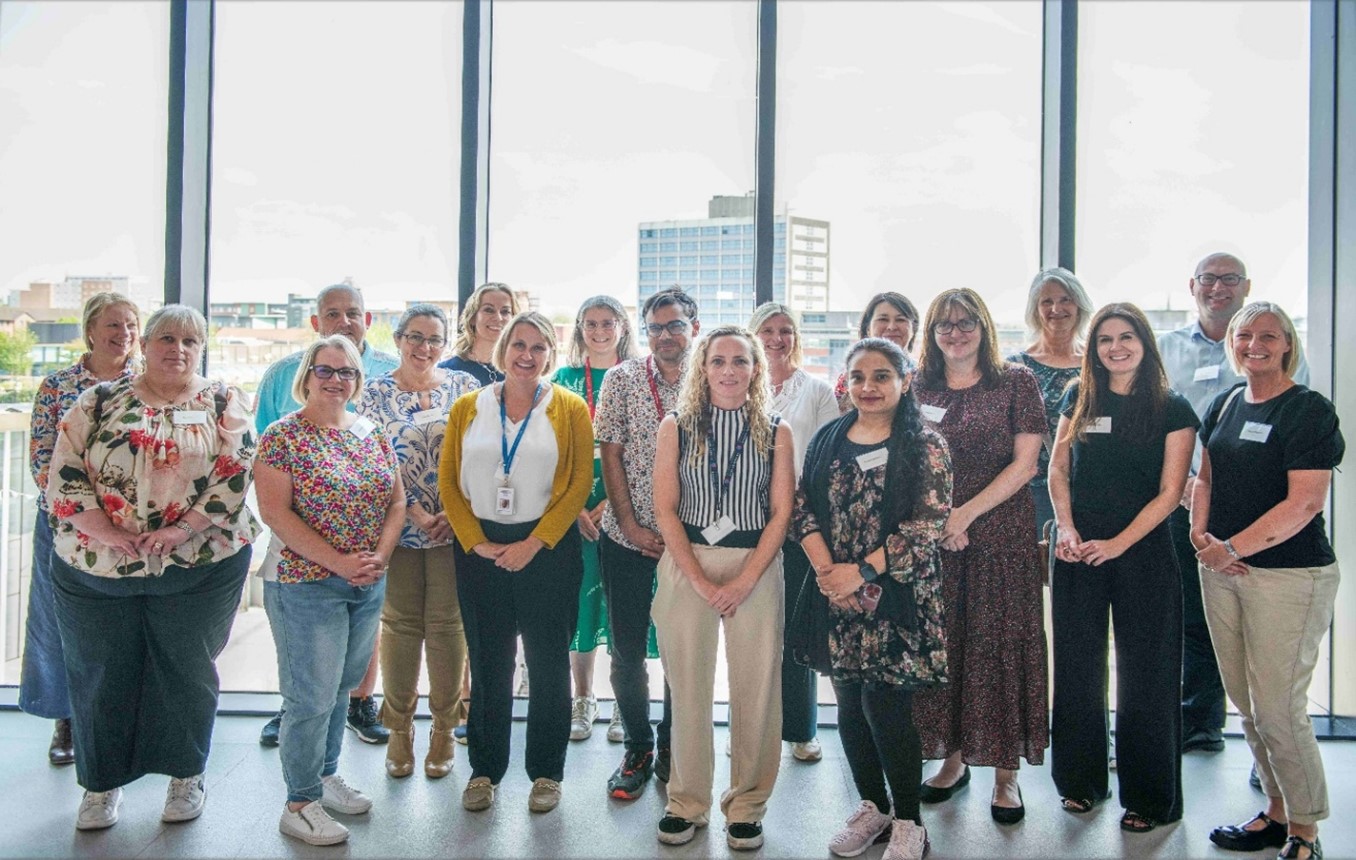The University of Central Lancashire Digital Rehabilitation Summit by ARC NWC Public Advisor Jamie Hunter

On 29th April at 9:30am till 12:15pm I together with other public research advisers, NHS health and social care professionals and senior researchers at UCLAN attended a Digital Rehabilitation Summit conference event at the Engineering and Innovation Centre UCLAN, Preston, Lancashire. The photo above shows a wonderful panoramic view of the city of Preston and the group of attendees at the event in which you can see myself and NIHR ARC NWC public adviser Farheen. The photo was taken at the top floor of the university campus.
The event began with a welcome talk from Vice Chancellor of UCLAN, Dr. Graham Baldwin mentioning about how excited he is that future health and social care research at the university is moving in the direction of embracing digital technology. The first research question that was given to us all to discuss as a team was how we best support service users and those that care for them to use technologies as part of their routine care? The digital divide and training were mentioned often in our group discussion, that service users, carers and health professionals need to be trained to better use this technology. It will enable service users to better manage their health conditions and get the outcome they desire to achieve. In other words, it’s not about health care professionals tailoring a digital technology to constantly remind a service user to do physiotherapy exercises that they feel will improve the service user’s health and social care outcomes. Instead, healthcare professionals will be working with service users by asking them what they desire to change in terms of their health problems. Making sure the digital technology can enable the service user to fix these health problems putting both the patient and healthcare professional on happy equal terms.
I suggested a solution to the group of using an Avatar digital technology application tool to help better engage with service users with Autism and ADHD. I believe the tool may open the social communication barriers for service users with these health conditions to be more comfortable. When it comes to engaging with this technology to communicate and share their health and social care problems to health care professionals. In other words, service users using the technology will have confidence to speak freely about their health and social care needs and intentions to a health care professional without feeling uncomfortable or overwhelmed by the professional setting.
After this comprehensive discussion as a group we moved onto the next research question posed upon us all. The topic this time was looking into what successful digital health technology adaptation looks like for different stake holders and how this can be evaluated effectively? Now this opened a big discussion, and it was agreed upon by everyone at the conference that patients’ data needs to be shared better across various NHS trusts and hopefully using digital technology can fix this problem. Service users (which includes us all) tend to be frustrated in having to repeat themselves time and time again to different healthcare professionals about their health care symptoms. As a group we understand that confidentiality of personal data is important and the importance of information governance within the NHS. However there needs to be some transparency in terms of freedom of information. When implementing this digital technology to prevent health care professionals not knowing the health and social care history of a service user. Resulting in a service user or carer having to repeat their health history every time, they see a newly assigned NHS professional.
Health inequalities and social determining factors was also covered in the discussion. It is ok, for NHS professionals and university academics rolling out this new innovative technology to better manage a service users health and social care. However, there are a lot of rural areas and coastal towns within the Northwest Coast of England in which social determining factors like financial stability, will prevent residents using this technology. Some people are just scraping by living, with the lack of jobs, education and services being cut in their rural coastal towns. Some people may not be able to juggle with affording internet broadband costs for using digital technology like this and this needs to be strongly considered. Measures also need to be put in place ensuring everyone can use the newly developed healthcare technology. The final point mentioned by the group was how can we measure and evaluate how effectively digital healthcare technology can be, when it comes to improving the health outcomes for service users. A quantitative statistical analyse software tool was mentioned by an NHS professional on my group. The tool is used by NHS services to measure health outcomes and can be adopted the same way to evaluate health care technology.
Overall, I felt that the UCLAN Digital Rehabilitation Submit was very informative and an interesting conference to vocalise my views and opinions. I certainly look forward to UCLAN or shall I say the University of Lancashire in the future hosting more events like this. Blog typed by:
JHunter
Jamie Hunter